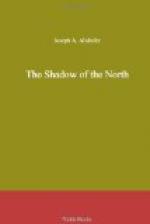The great crowd, which had been shouting, each side for its favorite, became silent as Blenheim and Cressy swept into the stretch. Stuart and Cabell, leaning far over the straining necks, begged and prayed their brave horses to go a little faster, and Blenheim and Cressy, hearing the voices that they knew so well, responded but in the same measure. The heads were even, as if they had been locked fast, and there was still no sign to indicate the winner. Faster and faster they came, their riders leaning yet farther forward, continually urging them, and they thundered past the stand, matched so evenly that not a hair’s breadth seemed to separate the noses of the sorrel and the bay.
“It’s a dead heat!” exclaimed Robert, as the people, unable to restrain their enthusiasm, swarmed over the track, and such was the unanimous opinion of the judges. Yet it was the belief of all that a finer race was never run in Virginia, and while the horses, covered with blankets, were walked back and forth to cool, men followed them and uttered their admiration.
Stuart and Cabell were eager to run the heat over, after the horses had rested, but the judges would not allow it.
“No! No, lads!” said the Governor. “Be content! You have two splendid horses, the best in Virginia, and matched evenly. Moreover, you rode them superbly. Now, let them rest with the ample share of honor that belongs to each.”
Stuart and Cabell, after the heat of rivalry was over, thought it a good plan, shook hands with great warmth three or four times, each swearing that the other was the best fellow in the world, and then with a great group of friends they adjourned to the tavern where huge beakers of punch were drunk.
“And mighty Todadaho himself, although he looks into the future, does not yet know which is the better horse,” said Tayoga. “It is well. Some things should remain to be discovered, else the salt would go out of life.”
“That’s sound philosophy,” said Willet. “It’s the mystery of things that attracts us, and that race ended in the happiest manner possible. Neither owner can be jealous or envious of the other; instead they are feeling like brothers.”
Then Robert’s mind with a sudden rush, went back to St. Luc, and his sense of duty tempted him to speak of his presence to Willet, but he concluded to wait a little. He looked around for him again, but he did not see him, and he thought it possible that he had now left the dangerous neighborhood of Williamsburg.
As they walked back to their quarters at a tavern Willet informed them that there was to be, two days later, a grand council of provincial governors and high officers at Alexandria on the Potomac, where General Braddock with his army already lay in camp, and he suggested that they go too. As they were free lances with their authority issuing from Governor Dinwiddie alone, they could do practically as they pleased. Both Robert and Tayoga were all for it, but in the afternoon they, as well as Willet, were invited to a race dinner to be given at the tavern that evening by Stuart and Cabell in honor of the great contest, in which neither had lost, but in which both had won.




